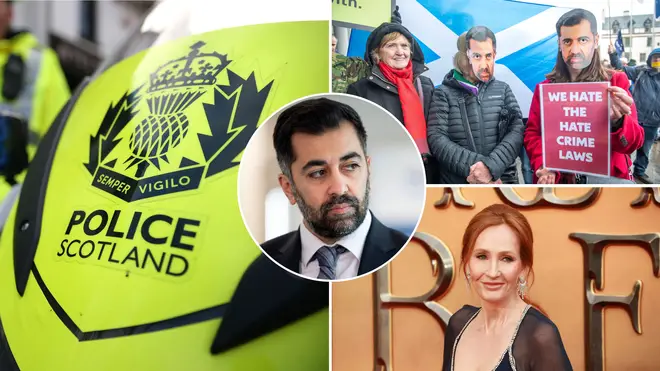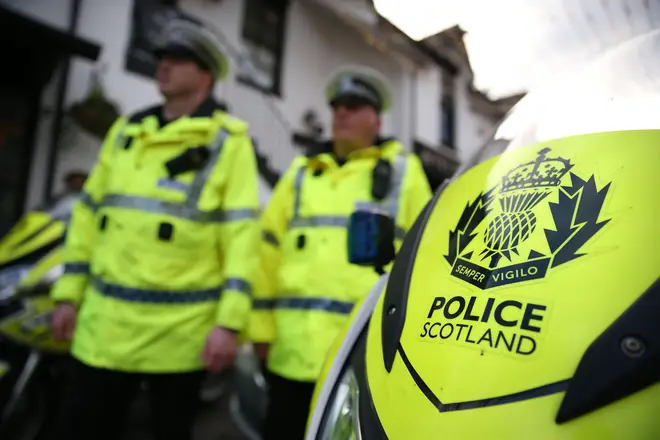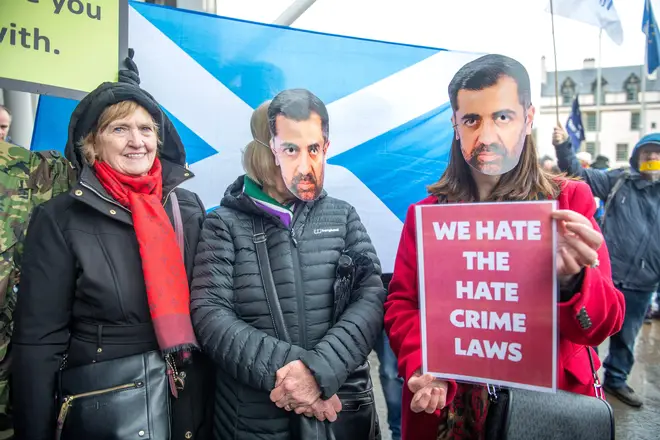
Nick Ferrari 7am - 10am
3 April 2024, 11:58 | Updated: 3 April 2024, 12:01

Police Scotland was flooded with nearly 4,000 complaints in the first two days of Humza Yousaf's hate crime law coming into force.
Police are reported to have received a complaint against the Act every two minutes during the first few days of the legislation.
It is understood that the number of complaints could have reached as high as 3,800, according to Calum Steele, the former general secretary of the Scottish Police Federation.
"More than half" have not yet been processed, he added, but every report will be considered, says Police Scotland.

The Hate Crime and Public Order (Scotland) Act 2021, which came into effect on Monday, makes it a criminal offence to make derogatory comments based on disability, religion, sexual orientation, transgender identity or being intersex.
Stirring up hatred based on race, colour, nationality or ethnicity was already illegal in Great Britain under the Public Order Act 1986 but is now included in the new law.

The new law has proved controversial, with roughly 300 protesters gathering outside Scotland's Parliament to demonstrate against the legislation, with some saying they are "prepared to be jailed".

Ex-Tory MP can't 'understand why SNP's new hate crime law is 'necessary'
Speaking on Cross Question to LBC's Iain Dale, ex-Tory MP Angela Knight said the new hate crime law is "unclear" and can't "understand why it's necessary."
High-profile freedom of speech activists have objected to the legislation, including Prime Minister Rishi Sunak, Elon Musk and American Commentator Joe Rogan.
When asked by LBC how he would respond to Elon Musk and Joe Rogan's comments, Humza Yousaf said: "They are right-wing actors of course and I think it's very clear, from particularly someone like Joe Rogan, that there's never going to be sympathy for the fact we are bringing in legislation that is clamping down on hatred."

Mr Yousaf added: "I'm very confident we've got a robust piece of legislation that will protect people against the riding tide of hatred we see right across the world."
One extremely outspoken public figure is author JK Rowling, a self-proclaimed TERF (trans-exclusionary radical feminist).
Included in a lengthy statement on Twitter, she wrote: “I look forward to being arrested when I return to the birthplace of the Scottish Enlightenment,” in response to the new legislation.
Police have already confirmed that comments made by Ms Rowling on social media on Monday were "not assessed to be criminal" and "no further action will be taken" against the writer.
Now, a Scottish Government minister has refused to say if comments by Harry Potter author JK Rowling could have been recorded by police as a non-crime hate incident.
Community safety minister Siobhian Brown said it is an operational matter for Police Scotland - who have been enforcing the new legislation.
A non-crime hate incident is recorded when an incident does not meet the threshold for a crime but is perceived to be "motivated (wholly or partly) by malice and ill-will towards a social group", according to Police Scotland guidance.